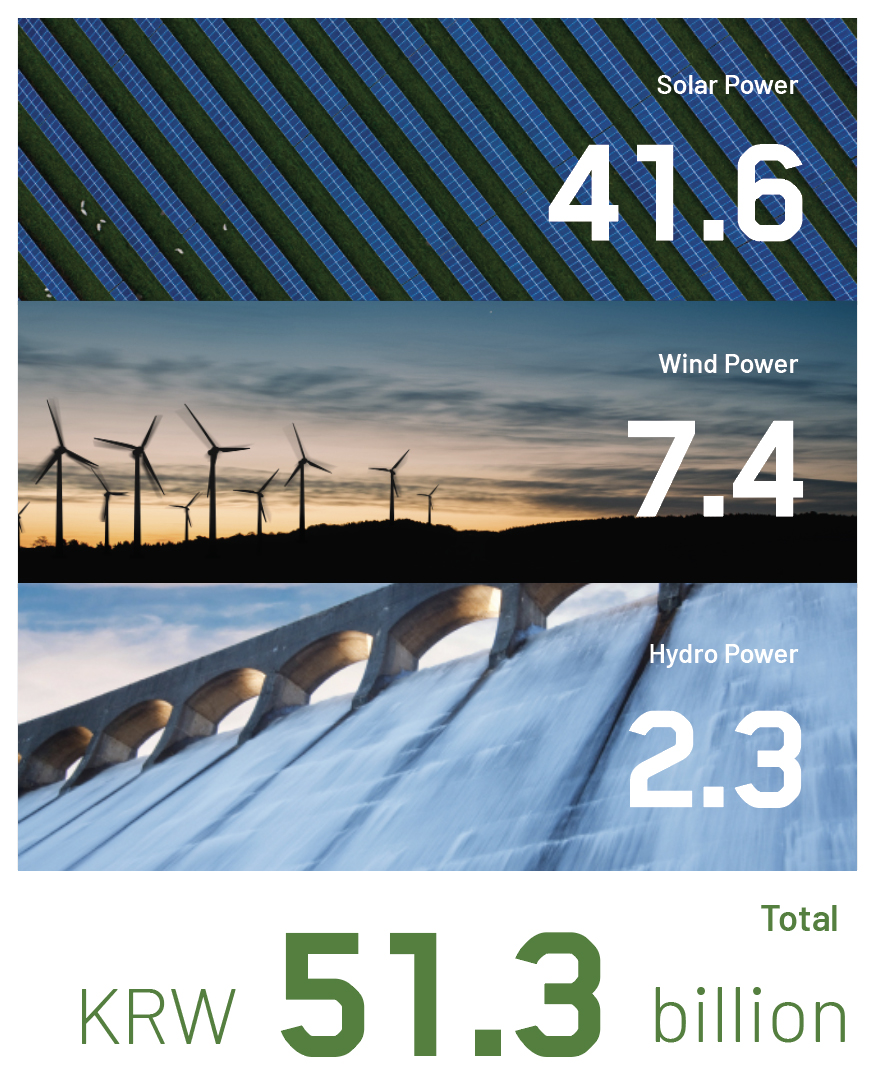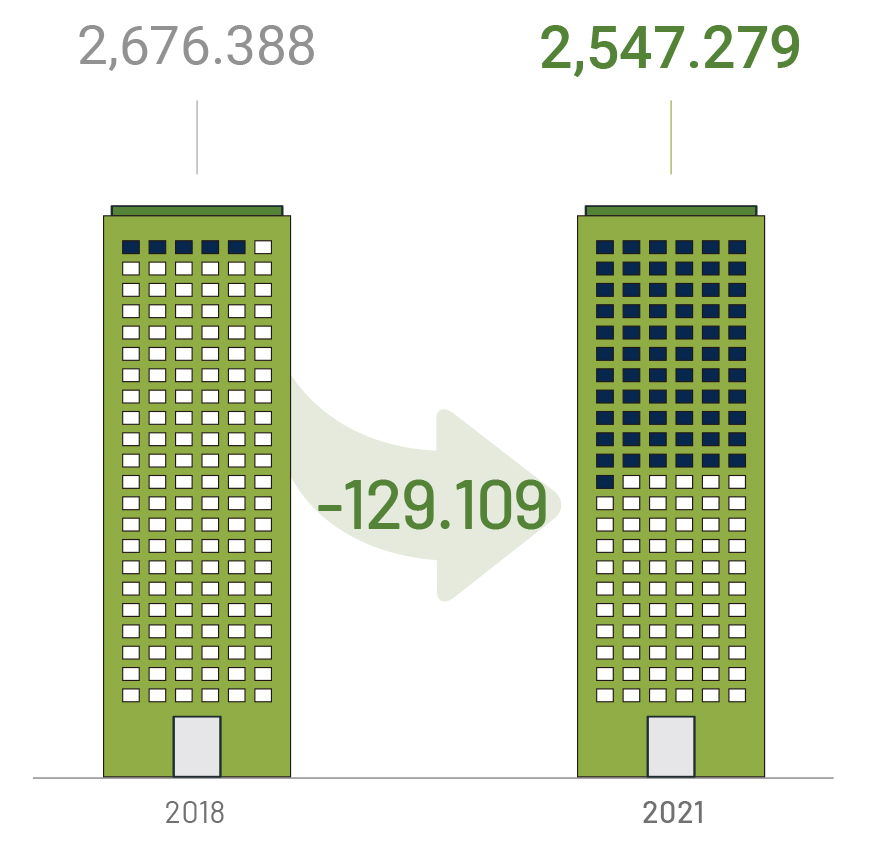Ensuring environmental sustainability is an important pillar of our endeavors to become an even more responsible business. We are taking various actions to manage our environmental impact and reduce our carbon footprint. These actions involve multiple dimensions, as we can make a positive impact on the environment in many ways.
First, we are committed to supporting the development of eco-friendly renewable energy sectors such as solar, wind, and hydro power generation. As the leading reinsurer in Korea, we will continue to play a key role in promoting clean energy initiatives by offering reinsurance coverage for the operators of a wide array of renewable energy businesses, including battery energy storage systems. As of 2021, we wrote premiums of over KRW 51.3 billion from the green energy sectors.
There is no doubt that eco-friendly renewable energy from sources like solar and wind power promises to provide a cleaner and more sustainable future, but the uncertainty of renewable energy technologies and related business operational risks presents challenges to operators, insurers, and investors alike. This is where Korean Re can step in to support their risk management. We will continue to work closely with primary insurers to offer a wide range of reinsurance solutions designed to help operators of renewable energy projects manage their risks and run their business stably.
Second, we are making progress in terms of quantifying and assessing our carbon footprint, which is a crucial first step in managing our direct impact on the environment. In this regard, we have compiled and disclosed data related to our energy use and greenhouse gas emissions because our carbon footprint primarily depends on how much energy we use in our office building.
In 2021, Korean Re saw its energy consumption and greenhouse gas emissions decrease by roughly 5% compared to 2018. We will continue to quantify how much we have an impact on the environment and will strive to reduce the impact, with a focus on increasing our energy efficiency.
Third, Korean Re is promoting industry collaboration in response to climate change. In this respect, we launched a task force (TF) for climate risk management in cooperation with the Korea Risk Management Society (KRMS) in December 2021. The TF is mandated to support collaborative studies by experts and professionals from a wide range of fields, including insurance, engineering, and climatology. By partnering with the TF and KRMS to encourage research on climate risks, Korean Re will continue to take the initiative in helping protect people, communities, and businesses against changing climate risks and unexpected events driven by climate change. This will ultimately contribute to strengthening climate resilience across the board.
Lastly, Korean Re has been actively operating a paperless smart work system since July 2016. The system enables all reports to be filed electronically, helping reduce the use of paper. Going paperless allows us not only to improve overall efficiency and convenience in our day-to-day operations, but also to reduce paper waste and preserve natural resources.
First, we are committed to supporting the development of eco-friendly renewable energy sectors such as solar, wind, and hydro power generation. As the leading reinsurer in Korea, we will continue to play a key role in promoting clean energy initiatives by offering reinsurance coverage for the operators of a wide array of renewable energy businesses, including battery energy storage systems. As of 2021, we wrote premiums of over KRW 51.3 billion from the green energy sectors.
There is no doubt that eco-friendly renewable energy from sources like solar and wind power promises to provide a cleaner and more sustainable future, but the uncertainty of renewable energy technologies and related business operational risks presents challenges to operators, insurers, and investors alike. This is where Korean Re can step in to support their risk management. We will continue to work closely with primary insurers to offer a wide range of reinsurance solutions designed to help operators of renewable energy projects manage their risks and run their business stably.
Second, we are making progress in terms of quantifying and assessing our carbon footprint, which is a crucial first step in managing our direct impact on the environment. In this regard, we have compiled and disclosed data related to our energy use and greenhouse gas emissions because our carbon footprint primarily depends on how much energy we use in our office building.
In 2021, Korean Re saw its energy consumption and greenhouse gas emissions decrease by roughly 5% compared to 2018. We will continue to quantify how much we have an impact on the environment and will strive to reduce the impact, with a focus on increasing our energy efficiency.
Third, Korean Re is promoting industry collaboration in response to climate change. In this respect, we launched a task force (TF) for climate risk management in cooperation with the Korea Risk Management Society (KRMS) in December 2021. The TF is mandated to support collaborative studies by experts and professionals from a wide range of fields, including insurance, engineering, and climatology. By partnering with the TF and KRMS to encourage research on climate risks, Korean Re will continue to take the initiative in helping protect people, communities, and businesses against changing climate risks and unexpected events driven by climate change. This will ultimately contribute to strengthening climate resilience across the board.
Lastly, Korean Re has been actively operating a paperless smart work system since July 2016. The system enables all reports to be filed electronically, helping reduce the use of paper. Going paperless allows us not only to improve overall efficiency and convenience in our day-to-day operations, but also to reduce paper waste and preserve natural resources.

Korean Re’s Eco-Friendly Reinsurance Business (2021)
Gross Written Premiums (Unit: KRW billion)

Greenhouse Gas Emissions from Korean Re Office Building
(Unit: tCO2-eq)

Note: tCO2-eq stands for tons (t) of carbon dioxide (CO2) equivalent (eq). A carbon dioxide equivalent, or CO2 equivalent or CO2-eq, is a metric measure used to compare the emissions from various greenhouse gases on the basis of their global warming potential (GWP) by converting amounts of other gases to the equivalent amount of carbon dioxide with the same global warming potential.
Greenhouse Gas Emissions from Korean Re Office Building
(Units: TJ, TOE)
| Year | Energy Use (TJ) |
Year on Year Change |
Energy Use (TOE) |
Year on Year Change |
| 2021 | 52.557 | 1.440 | 1,255.342 | 34.418 |
| 2020 | 51.117 | -1.026 | 1,220.924 | -24.489 |
| 2019 | 52.143 | -3.082 | 1,245.413 | -73.612 |
| 2018 | 55.225 | 0.980 | 1,319.025 | 23.408 |
| 2017 | 54.245 | 0.299 | 1,295.617 | 7.146 |
| 2016 | 53.946 | 1.513 | 1,288.471 | 36.119 |
| 2015 | 52.433 | -2.200 | 1,252.352 | -52.549 |
Note: TJ stands for terajoule, and it is a unit of energy in the International System of Units. TOE refers to ton of oil equivalent, which represents the quantity of energy contained in a ton of crude oil. This unit is used to express and compare energies of different sources.

